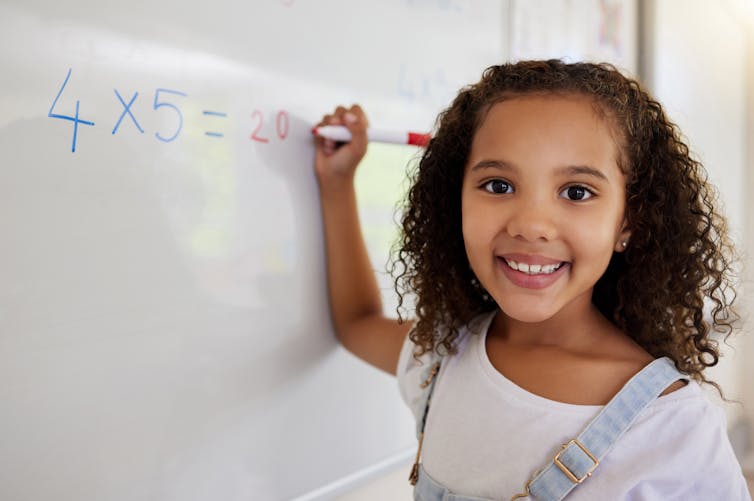
Yasemin Copur-Gencturk, University of Southern California; Ian Thacker, The University of Texas at San Antonio, and Joseph Cimpian, New York University
The Research Brief is a short take about interesting academic work.
The big idea
Math teachers who believe women no longer face discrimination tend to be biased against girls’ ability in math. This is what we found through an experiment we conducted with over 400 elementary and middle school math teachers across the United States. Our findings were published in a peer-reviewed article that appeared in April 2023 in the International Journal of STEM Education.
For our experiment, we asked teachers to evaluate a set of student solutions to math problems. The teachers didn’t know that gender- and race-specific names, such as Tanisha and Connor, had been randomly assigned to the solutions. We did this so that if they evaluated identical student work differently, it would be because of the gender- and race-specific names they saw, not the differences in student work. The idea was to see if the teachers had any unconscious biases.
After the teachers evaluated the student solutions, we asked a series of questions about their beliefs and experiences. We asked if they felt society had achieved gender equality. We asked them whether they felt anxious about doing math. We asked whether they felt students’ ability in math was fixed or could be improved. We also asked teachers to think about their own experience as math students and to report how frequently they experienced feelings of unequal treatment because of their race or gender.
We then investigated if these beliefs and experiences were related to how they evaluated the math ability of students of different genders or racial groups.
Consistent with our prior work, we found that implicit bias against girls arises in ambiguous situations — in this case, when student solutions were not completely correct.
Further, for teachers who believed that U.S. society had achieved gender equality, they tended to rate a student’s ability higher when they saw a male student name than when they saw a female student name for the same student work.
Why it matters
Teachers’ unconscious gender biases in math classes have been documented repeatedly.
Our study identifies factors that underlie such biases; namely, that biases are stronger among teachers who believe that gender discrimination is not a problem in the United States. Understanding the relationship between teachers’ beliefs and biases can help teacher educators create effective and targeted interventions to remove such biases from classrooms.
Our findings also shed light on potential reasons that males tend to have higher confidence in math and stick with math-intensive college majors even when they’re not high performers.
What still isn’t known
One big remaining question is how to create targeted interventions to help teachers overcome such biases. Evidence suggests that unconscious biases come into play in situations where stereotypes might emerge. Further, research suggests that these unconscious biases can be suppressed only when people are aware of them and motivated to restrain them.
Since bias may take on different forms in different fields, a one-time, one-size-fits-all anti-bias training may not have a lasting effect. We think it’s worthwhile to investigate if it’s more effective to provide implicit bias training programs that are specific to the areas where bias is revealed.![]()
Yasemin Copur-Gencturk, Associate Professor of Education, University of Southern California; Ian Thacker, Assistant Professor of Educational Psychology, The University of Texas at San Antonio, and Joseph Cimpian, Professor of Economics and Education Policy, New York University
This article is republished from The Conversation under a Creative Commons license. Read the original article.
